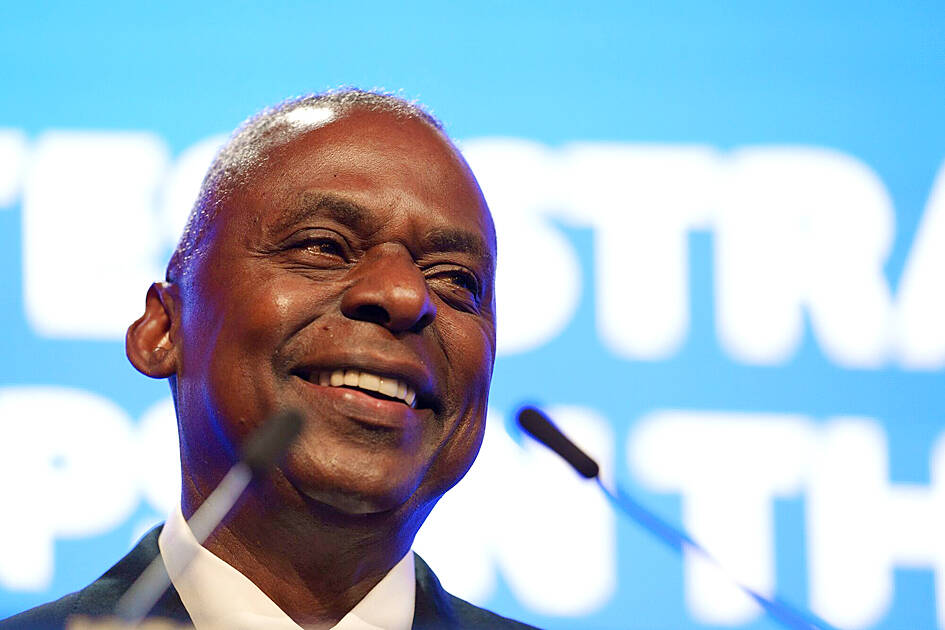US Secretary of Defense Lloyd Austin yesterday hailed a “new era of security” in the Asia-Pacific region, as Washington bolsters its network of alliances aimed at countering China’s growing military might and influence.
From Japan to Australia, the US has been deepening defense ties across the region, ramping up joint military exercises and regularly deploying warships and fighter jets in the Taiwan Strait and South China Sea — infuriating Beijing.
Responding to Austin, Chinese Lieutenant General Jing Jianfeng (景建峰) accused the US of seeking to build “an Asia-Pacific version of NATO,” and described the superpower as the “greatest challenge to regional peace and stability.”

Photo: Bloomberg
In the past three years, Austin said there had been a “new convergence around nearly all aspects of security” in the Asia-Pacific region, where there was a shared understanding of “the power of partnership.”
“This new convergence is producing a stronger, more resilient and more capable network of partnerships and that is defining a new era of security in the Indo-Pacific” region, Austin told the Shangri-La Dialogue in Singapore.
However, it was not “about imposing one country’s will” or “bullying or coercion,” Austin said, in an apparent shot at China, which has increased its saber rattling over Taiwan and grown more confident in pressing its claims in the South China Sea.
“This new convergence is about coming together and not splitting apart,” Austin said. “It’s about the free choices of sovereign states.”
The Shangri-La Dialogue, a major security forum attended by defense officials from around the world, has become a barometer of US-China relations in the past few years.
This year’s edition comes a week after China held military drills around Taiwan and warned of war following the inauguration of President William Lai (賴清德), who Beijing has described as a “dangerous separatist.”
Taiwan is one of the thorniest disputes in US-China relations.
Austin on Friday met with Chinese Minister of National Defense Dong Jun (董軍) for the first substantive face-to-face talks between the two countries’ defense heads in 18 months.
Beijing scrapped military communications with Washington in 2022 in response to then-US House of Representatives speaker Nancy Pelosi’s visit to Taiwan.
Tensions between Washington and Beijing were further stoked by issues including an alleged Chinese spy balloon that was shot down over US airspace, a meeting between then-president Tsai Ing-wen (蔡英文) and then-US House speaker Kevin McCarthy, and US military aid for Taipei.
Friday’s meeting offered hopes of further military dialogue that could help prevent issues from spinning out of control.
Austin said the US and China would resume military-to-military communications “in the coming months,” while Beijing hailed the “stabilizing” security relations between the countries.
“I told Minister Dong that if he calls me on an urgent matter, I will answer the phone,” Austin said yesterday. “And I certainly hope that he’ll do the same.”
The Asia-Pacific region remained Washington’s “priority theater of operations,” he said, adding that “the United States can be secure only if Asia is.”
“We are all in and we’re not going anywhere,” he said.

A car bomb killed a senior Russian general in southern Moscow yesterday morning, the latest high-profile army figure to be blown up in a blast that came just hours after Russian and Ukrainian delegates held separate talks in Miami on a plan to end the war. Kyiv has not commented on the incident, but Russian investigators said they were probing whether the blast was “linked” to “Ukrainian special forces.” The attack was similar to other assassinations of generals and pro-war figures that have either been claimed, or are widely believed to have been orchestrated, by Ukraine. Russian Lieutenant General Fanil Sarvarov, 56, head

SAFETY FIRST: Double the number of police were deployed at the Taipei Marathon, while other cities released plans to bolster public event safety Authorities across Taiwan have stepped up security measures ahead of Christmas and New Year events, following a knife and smoke bomb attack in Taipei on Friday that left four people dead and 11 injured. In a bid to prevent potential copycat incidents, police deployments have been expanded for large gatherings, transport hubs, and other crowded public spaces, according to official statements from police and city authorities. Taipei Mayor Chiang Wan-an (蔣萬安) said the city has “comprehensively raised security readiness” in crowded areas, increased police deployments with armed officers, and intensified patrols during weekends and nighttime hours. For large-scale events, security checkpoints and explosives

PUBLIC SAFETY: The premier said that security would be tightened in transport hubs, while President Lai commended the public for their bravery The government is to deploy more police, including rapid response units, in crowded public areas to ensure a swift response to any threats, President William Lai (賴清德) said yesterday after a knife attack killed three people and injured 11 in Taipei the previous day. Lai made the remarks following a briefing by the National Police Agency on the progress of the investigation, saying that the attack underscored the importance of cooperation in public security between the central and local governments. The attack unfolded in the early evening on Friday around Taipei Main Station’s M7 exit and later near the Taipei MRT’s Zhongshan

REBUFFED: In response to Chinese criticism over recent arms sales, Washington urged Beijing to engage in meaningful dialogue instead of threats and intimidation Washington’s long-term commitment to Taiwan would not change, the US Department of State said yesterday, urging Beijing to stop pressuring Taiwan and engage in meaningful bilateral dialogues. The remarks came in response to a backlash from Beijing about Washington’s latest approval of arms sales to Taiwan. The US Defense Security Cooperation Agency said in a statement on Wednesday that the Taipei Economic and Cultural Representative Office in the US has asked to purchase an arms package, including Tactical Mission Network Software; AH-1W helicopter spare and repair parts; M109A7 self-propelled howitzers; HIMARS long range precision strike systems; tube-launched, optically tracked, wire-guided missiles; Javelin